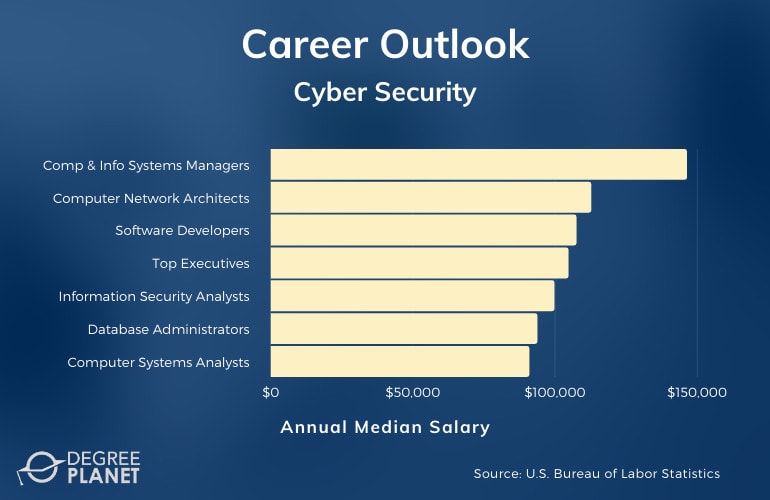As more and more career fields move online, the popularity of online cybersecurity degree programs is increasing. The need for new cyber security experts is growing every day.

Editorial Listing ShortCode:
If you have an interest in keeping people, businesses, or the government safe from cyber threats, this might be the degree for you.
Online Cyber Security Degrees

If you’re interested in pursuing a cybersecurity undergraduate degree, usually a bachelor of science, and want to be successful in helping to solve real world security problems, there are a few characteristics that can be beneficial. First off, you need to be good with computers and technology.
Attention to detail and a laser-like focus are also important. Cyber forensics requires just as much concentration and scrutiny as actual forensics.
This is a career that’s constantly changing, growing, expanding, and evolving, so being a continual learner is typically required as well. Having an analytical mind, a strong sense of curiosity, the ability to remain calm under pressure, and the drive to persevere are also useful traits to have.
Bachelor of science cybersecurity programs typically put heavy emphasis on internet security controls and countering cyberattacks, so most cybersecurity courses focus on these topics in some manner. Cybersecurity programs typically include general computer science classes as well. Many of these will likely be “Introduction to” classes, such as introduction to computers, programming, networking, and software development.

Most potential jobs for those with this degree are directly in the field of cybersecurity, such as:
- Cybersecurity consultants
- Cybersecurity auditors
- Chief cybersecurity officers
- Cybersecurity software developers
- Cybersecurity assurance engineers
- Ethical hackers
- Risk management experts
- Cryptographers
- Incident responders
- Vulnerability assessors
Because students in this degree program take so many general computer science classes, there are also non-cybersecurity jobs you could apply for after earning this degree. You might become a:
- Network architect
- Network engineer
- Systems engineer
- Software engineer
- Software developer
- Computer networks administrator
Editorial Listing ShortCode:
As you can see, a cybersecurity bachelor’s degree can help open a lot of doors for you career-wise. Also, all the jobs available for cybersecurity professionals to pursue with an associate’s degree should still be available with a bachelor’s degree in the field. Employers are more likely to pay you more if you have a bachelor’s degree, especially if you have a master’s or PhD in cyber security online or through an on-campus program.
Cyber Security Curriculum & Courses

At the bachelor’s level, students typically take more advanced courses in some of the same subjects they took at the associate’s level. Ten of the most common courses at this level are:
- Computer Hardware and Peripherals: This class explores the types of computer hardware and other tech used by hackers to commit cybercrimes, as well as how to build, configure, and repair this technology in computer networks.
- Economic Crime Theory: This class explores cyber threats related to money, such as fraud, identity theft, and the stealing of bank and credit card information.
- Applied Cryptography: This class gives the basics of cryptographic techniques and hands-on experience.
- Mathematics for Cyber Security: In this class, students explore math in the context of cyber security, including algorithms, number systems, cryptography, logic, and set theory.
- Criminology: Even though it’s online, cybercrime is still a crime. This class studies deviant behavior and how it relates to social structure and values and explores theories of treatment, control, and corrections.
- Payment Systems and Fraud: This class studies modern means of global payment, fraud, and economic investigation.
- Ethical Hacking I, II, and III: These courses teach students hacking skills in order to combat skilled hackers.
- Systems Vulnerability Assessments: This class explores threats to information systems and how to use hands-on methods to discover weaknesses in operating systems, help prevent data breaches, and develop risk management and incident response strategies.
- Cyber Law: This class covers the basics of the internet’s legal system.
- Cyber Security Internship: This is usually taken in a program’s last semester and places students in situations helping to solve real world security problems inside offices and to apply the skills they’ve learned in network security controls and other areas.
These are only some examples of the classes you may take in an online cybersecurity degree program.
BS in Cyber Security vs. BS in Computer Science

If you want to work in cybersecurity, there are a couple of ways to do it. A bachelor’s in cyber security will likely give you the most comprehensive education in the field.
A bachelor’s in computer science may also lead to cyber security jobs.
BS in Cyber Security

A degree program in cyber security will likely have a more specific focus on the actual cyber security field. Also, many cybersecurity programs have CAE-CD designations that certify them as having the most rigorous cyber security classes and standards possible.
While there are a few other non-cyber security jobs you might be eligible for with this degree, such as risk management assessor, for example, most of your options will likely be in cyber security.
If you’re certain cybersecurity is what you want to do, this is probably the better choice. Because the field is specialized, having an actual cyber security degree may mean you’re better equipped to deal with the types of things you need to deal with in cyber security.
Also, the salary for people with cyber security degrees in cyber security jobs is usually higher than that of people with computer science degrees in cyber security jobs.
BS in Computer Science

If you aren’t 100% sure you want to go into cyber security, a degree in computer science might be the better option. If you earn your degree in this field, you’re probably going to have a less specific focus on cyber security, but you’ll likely still have enough of what you need to pursue a job in cyber security later if you so choose.
With a CS degree, you’ll likely have a much larger job pool to pull from. Your potential jobs won’t be limited to only cyber security jobs. Instead, you’ll have a wide variety of jobs you can pursue, such as data analyst, software engineer, IT specialist, IT tech, IT manager, or IT director.
While you may not be paid as much if you eventually take a cyber security job with your BS in Computer Science, some of the other jobs you’ll be eligible to pursue may pay more than cyber security jobs.
Cyber Security Careers & Salaries

Most of the careers you’ll be eligible to pursue after earning your bachelor’s degree in cyber security are related to cyber security fields. There are a few exceptions to this, though.
For instance, you’ll likely take enough general computer classes to help prepare you for a career as a software developer, data scientist, IT technician, systems engineer, or network architect.
Most of the highest-paying jobs you can pursue will likely be in the cyber security fields, though. According to the Bureau of Labor Statistics, some careers in the cyber security field and their median salaries are:
| Careers | Annual Median Salary |
| Computer and Information Systems Managers | $151,150 |
| Computer Network Architects | $116,780 |
| Software Developers, Quality Assurance Analysts, and Testers | $110,140 |
| Top Executives | $107,680 |
| Information Security Analysts | $103,590 |
| Database Administrators | $98,860 |
| Computer Systems Analysts | $93,730 |
| Computer Programmers | $89,190 |
| Network and Computer Systems Administrators | $84,810 |
| Web Developers | $77,200 |
Once you reach the bachelor’s level, the potential career paths for cyber security graduates can be lucrative. Even the jobs that can be pursued with only an associate’s degree may pay more once you have a cybersecurity bachelor’s degree.
Accreditation

Likely one of the first things you want to do before enrolling in any college or university is to check its accreditation status. The accreditation to look for is regional accreditation. There are six regional accreditation agencies that provide accreditation to schools that grant bachelor’s degrees. These are:
- HLC: Higher Learning Commission
- NECHE: New England Commission of Higher Education
- WSCUC: WASC Senior College and University Commission
- NWCCU: Northwest Commission on Colleges and Universities
- SACSCOC: Southern Association of Colleges and Schools Commission on Colleges
- MSCHE: Middle States Commission on Higher Education
There is a seventh accreditation agency—the Accrediting Commission for Community and Junior Colleges Western Association of Schools and Colleges (ACCJC)—but it only accredits community, junior, and technical colleges.
If your school is accredited by one of the above agencies, your degree will be more likely to be accepted by potential employers all over the U.S. If you decide to continue on to graduate school, your transfer credits are more likely to be accepted at other universities.
Cyber Security CAE IA/CD Designation

In addition to ensuring your college has regional accreditation, when it comes to a degree in cyber security, there’s an additional factor to look for in a college cyber defense education program: whether or not your college’s cybersecurity program has a CAE IA/CD, also referred to as a CAE-CD, designation.
The CAE-CD designation was created by the National Security Agency (NSA) and the Department of Homeland Security (DHS). The acronym stands for “Center of Academic Excellence in Cyber Defense.”
If your school’s cybersecurity program is designated as a CAE-CD program, you can feel more secure that you’ll be receiving a high-quality, rigorous cybersecurity education.
There are three different designations for programs offering programs in cyber defense education. They are:
- CAE-R: For institutions of higher learning who have research programs dedicated to cyber defense and incident response.
- CAE-2Y: For colleges offering associate’s degrees.
- CAE-CDE: For schools with bachelor’s and graduates.

Editorial Listing ShortCode:
If you’re working towards your bachelor’s degree, checking to see if your school is designated as a CAE-CDE program is a good idea. This designation serves as an indication that the school provides one of the most comprehensive programs in cybersecurity education possible and that cyber security graduates will be well prepared to take on entry-level roles.
Completing your degree program and earning your B.S. in Cyber Security can help you develop the skills needed to work not only for individuals or corporations but also for the U.S. government.
You could potentially go on to work in a tribal, state, or federal government position. This degree program can help you learn how to face the most experienced and dangerous cybercriminals.
Licensing

After earning your B.S. in Cyber Security, here are some industry certifications for cybersecurity professionals that you may want or need, depending on the job you pursue:
- Certified Forensic Computer Examiner: The Certified Forensic Computer Examiner (CFCE) license is issued once you’ve undergone and successfully completed a series of technical computer/digital forensics and network security competency exams in the form of a certification phase and peer review phase. Certification must be renewed every three years.
- Certified Information Systems Security Professional: To earn this certification, you must have at least five years of experience in the information security field. This certification shows you can effectively design, implement, and manage your own high-quality cybersecurity program.
- Licensed Penetration Tester: To become a Licensed Penetration Tester, you must take an incredibly rigorous exam designed to demonstrate a complete mastery of the network security skills needed to enact a full penetration test of a network.
Some of these industry certifications can take years to earn, but if you don’t get discouraged and keep at it, you can eventually get there.
Financial Aid

If you’re eligible, financial aid can be a huge help when it comes to paying for your college education. At the bachelor’s level, two of the most popular forms of financial aid are grants, specifically the Federal Pell Grant, and loans, particularly federal loans. You can apply for both by filling out the FAFSA.
If you receive a Pell Grant and don’t abuse it, you should never have to pay that money back, so most people prefer the Pell Grant to any other type of assistance. Loans, whether federal or from a bank or credit union, do eventually have to be repaid, so it is important to borrow responsibly.
Cyber Security Scholarships

Scholarships are another great type of financial aid. There are even some specifically for cyber security majors, such as:
- Information Systems Security Association Foundation Scholarship: Also known as the ISSA, this scholarship is offered to deserving students who major in computer science and have cyber security as their focus.
- Computing Research Association: This association provides many scholarships a year to students in tech/computer fields.
- Center for Cyber Safety and Education Undergraduate Scholarships: These scholarships are specifically for students majoring in cyber security.
- CyberCorps Scholarship for Service: If you hope to work for the government after earning your degree, this scholarship might be for you.
- CompTIA Rising Star: If you’re a CompTIA member pursuing a degree in technology, you might be eligible for this scholarship.
Other scholarships may be found on your school’s website and on dedicated scholarship websites.
What Major Is Best for Cyber Security?

If you want a career in cyber security, the best major you can pursue may be a cyber security major because it’s so specific and will likely give you the most information specifically on cyber security possible.
If that’s not an option for some reason, you may also major in computer science with a focus on cyber security.
Is a Cyber Security Degree Worth It?
Yes, for those considering a career in cyber security, the degree is often worth it.
The Bureau of Labor Statistics projects 11% job growth in computer and information technology occupations for the next 10 years, which is much faster than the average for all occupations. Common careers in this field include network and computer systems administrator, information security analyst, software developer, computer network engineer, and IT director.
This degree can help open up potential career paths in cyber security that you may not qualify for any other way.
What Jobs Can I Get with a Cyber Security Degree?
There are plenty of potential jobs you can pursue with a cyber security bachelor’s degree.
A bachelor’s degree in the field can help open up many higher-level positions for cybersecurity professionals to you, and the general computer classes you’ll be required to take are usually sufficient enough for branching out and pursuing jobs in other computer fields if you wish.
Some of the most common jobs for people with this degree include cyber security analyst, manager, director, specialist, technician, or consultant. Others include penetration tester, incident responder, data breaches expert, network security specialist, ethical hacker, cryptographer, data scientist, and information security engineer.
Is a Cyber Security Degree Hard?

The path for a cybersecurity degree program is often a very rigorous one that requires strenuous attention to detail and intense focus. This degree usually takes a lot of work, and it can be incredibly fast-paced.
If you have a genuine interest in the field and any skills with computers at all, though, the degree program shouldn’t be so hard that you can’t succeed in it.
Most bachelor’s programs are tough and challenging in their own ways. If they aren’t, you may not be getting everything you need from them.
If you take a cybersecurity degree program from a school with CAE-CD designation, the program will likely be even more difficult. According to many, though, cybersecurity programs with this certification are some of the best you can take.
What Is the Cyber Security Degree Salary?
Just as is the case with any degree field, the salary cybersecurity professionals earn after completing this program will differ depending on a number of factors, such as the state they’re working in and, most importantly, what job they’re hired to do after college.
Your salary may vary by as much as $30,000 or more depending on whether you become a penetration tester or a cryptographer.
With a bachelor’s in cyber security, though, you should be able to expect a salary that’s higher than the national average. The average salary for computer and information technology occupations is $91,250 (Bureau of Labor Statistics).
As the job titles get more prestigious, the average salary typically climbs upwards. Most people make very good money with this degree.
What Is Cyber Security?

At its core, cyber security is all about protecting the online doings of individuals, businesses, corporations, and government agencies. It’s the practice of ensuring the protection of computer programs, websites, computer networks, and operating systems from cyber crime, also known as digital attacks.
Generally, digital attacks are aimed at individuals or larger organizations with the goal of obtaining sensitive information from computers, cell phones, tablets, and other digital devices. They’ll then access and change or use that information to hurt others through means of extortion, blackmail, or just simply disrupting the way things work.
Cyber security seeks to prevent these attacks from happening, stop them when they do, and minimize the damage they cause.
What Is the Best Kind of Cyber Security Degree to Get?
A Bachelor of Science in Cyber Security from a CAE-CD designated school is often considered the best undergraduate cyber security degree you can get. It is supposed to give students the most comprehensive training in the field in the fewest years.
If you hope to pursue your graduate degree in cyber security, that’s going to be more comprehensive, but an undergraduate cybersecurity degree program can also help you learn much of what you need to know to become an effective deterrent against cyber crime.
You also always have the option of earning a traditional or online cyber security associate degree to kick start your career in this field and help determine if it is the right choice for you.
What Can You Do with an Online Cyber Security Degree?
As long as your online cybersecurity degree program is offered at a regionally accredited university, you should be able to do anything with it that you can with a cyber security degree earned from an on-campus program.
As long as your online cybersecurity degree program is regionally accredited, it should be afforded the same respect as other regionally accredited degree programs.
How Much Does an Online Cybersecurity Degree Cost?

There are numerous schools out there, both public and private, offering an online cybersecurity degree program. The tuition rates vary widely between each school. With that in mind, there’s really no way to tell you exactly how much an online cybersecurity bachelor’s degree will cost. We can give you an estimate and a way to figure it out for yourself, though.
A cybersecurity bachelor’s degree program usually takes about 120 credit hours to complete. (An associate degree in the same field usually takes about 60.)
When you find a school you’re interested in attending, simply look up the cost per credit hour and multiply that by 120 (or 60 for an associate degree program) to get your approximate tuition cost. This will not, of course, include fees, books, and other non-tuition expenses.
For in-state students at public colleges, the average tuition rate per credit hour for a cybersecurity program is between $210 and $475. Assuming you’re taking 30 credit hours per year, that’s a range of $6,300 to $14,250 a year.
How Long Does It Take to Complete an Online Cybersecurity Degree?

This is another question we can’t provide a concrete answer for. A typical cybersecurity bachelor’s degree program usually takes about 120 credit hours. Depending on whether you’re a full-time student or just taking one or two classes a semester, the length of time it takes you to earn those 120 hours could vary greatly.
Many colleges now offer accelerated degree programs in cyber security, where instead of taking a traditional program that consists of 120 credit hours divided into 8 semesters, you can take several mini semesters back-to-back. These semesters are usually just 8 weeks long or less.
You may take two classes at a time, finish those in 8 weeks, and then immediately start another two classes for another 8 weeks.
Taking accelerated courses in your cybersecurity degree program can keep you learning at a much quicker pace and give you the opportunity to graduate much sooner than the traditional 4 years.
Universities Offering Online Cyber Security Bachelor’s Degree Program
Methodology: The following school list is in alphabetical order. To be included, a college or university must be regionally accredited and offer degree programs online or in a hybrid format.

Founded in 1966, Bellevue University is nationally known for its commitment to higher education. Offering undergraduate and graduate degrees in a multitude of academic majors, BU blends applied learning with scholarly academia for a well-rounded curriculum.
- BS in Cybersecurity
Bellevue University is accredited by the Higher Learning Commission.

Opened under a different name in 1927, Capitol Technology University is a top-ranking private school for higher learning according to U.S. News & World Report. With partnerships with NASA and other industry leaders, Capitol Technology University offers an array of STEM, business, and other majors to students looking to gain undergraduate or graduate degrees.
- BS in Cybersecurity
Capitol Technology University is accredited by the Commission on Higher Education of the Middles States Association of Colleges and Schools.

Champlain College serves students across the nation by providing vigorous private instruction that assists them in obtaining associate, bachelor’s, or graduate degrees. Opened in 1878, Champlain University has expanded to many nations across the globe through its campus settings, dynamic distance learning, and study abroad programs.
- Bachelor’s in Cyber Security
Champlain College is regionally accredited by the New England Commission of Higher Education.

Helping students earn a higher education through alternative means since 1973, Charter Oak State College is a public liberal arts college.
COSC allows students to earn associate, bachelor’s, or master’s degrees through online courses, work-study programs, or military experience. Using academic assessments, COSC monitors and evaluates student learning regularly.
- BS in Cyber Security
Charter Oak State College is accredited by the New England Commission of Higher Education.

Established in 1973 as a private, postsecondary school, City University of Seattle strives to be the perfect place for working adults to study and earn undergraduate and graduate degrees geared toward their individual goals. City University of Seattle partners with industry leaders to provide students with co-op and apprenticeship learning opportunities.
- BS in Cybersecurity and Information Assurance
City University of Seattle is accredited by the Northwest Commission on Colleges and Universities.

Colorado Technical University has been a leader in STEM learning since 1965. Paving pathways to associate, bachelor’s, and graduate degrees, CTU ranks high among private educational institutions. Allowing students to attend online and face-to-face classes, Colorado Technical University sets the stage for all students to achieve success.
- BS in Computer Science – Cybersecurity Engineering
Colorado Technical University is accredited by the Higher Learning Commission.

DeVry University began offering private educational options to students in 1931. Over time, DeVry has expanded its programs to reach across the globe through access to over forty campuses and distance learning opportunities. Enrolled students have access to many program options that can help them obtain undergraduate and graduate degrees.
- Bachelor’s in Cyber Security Programming
DeVry University is accredited by the Higher Learning Commission.

Opened in 1971, Excelsior College works to be a leader in private-based alternative education. It has built a top-of-the-line virtual learning platform to allow students a variety of ways to earn one of its many undergraduate and graduate degrees.
Many students choose to utilize self-study options or provide proof of course understanding through competency exams.
- BS in Cybersecurity
Excelsior College is accredited by the Commission on Higher Education of the Middle States Association of Colleges and Schools.

Started in 1902 as a private school, Franklin University now has several learning centers throughout Ohio. Students at Franklin University have access to a variety of campus activities but can choose to attend most courses via virtual learning.
With an abundance of undergraduate and graduate degrees, Franklin University strives to make finding a successful path an easy option.
- BS in Cybersecurity
Franklin University is regionally accredited by the Higher Learning Commission.

Considered one of the most significant public schools in Virginia on basis of enrollment, George Mason University enrolls thousands of students each year. Research studies and technology are imperative to the programs offered at GMU.
All undergraduate, graduate, and doctoral degree programs offered at GMU are designed to teach students how to be innovators and help solve real-world problems facing their communities.
- BAS in Cybersecurity
George Mason University is accredited by the Commission on Colleges of the Southern Association of Colleges and Schools.

Kennesaw State University opened in 1963 as a public institution for higher learning. With one of the highest enrollment statuses in the state, Kennesaw University reaches thousands of students around the globe each year. While working toward undergraduate or graduate degrees, students at KU can access their academic programs online or in person.
- BS in Cybersecurity
Kennesaw State University is accredited by the Southern Association of Colleges and Schools Commission on Colleges.

Students have been able to gain professional and educational advancement at Maryville University since 1872. Maryville University serves students throughout the nation and in more than 40 other countries across the globe.
Helping students earn undergraduate and graduate degrees in more than 90 academic programs, MU is a leader in private education.
- BS in Cyber Security
Maryville University is regionally accredited by the Higher Learning Commission.

Norwich University started providing public education in 1819. This academic facility was first opened to military members and now serves all community members through campus-wide classes and distance learning options. Each student enrolled at Norwich University has the opportunity to earn an undergraduate or graduate degree in a variety of majors.
- BS in Cyber Security
Norwich University is accredited by the New England Commission of Higher Education.

Nestled in the heart of Norfolk, Virginia, Old Dominion University opened its doors to provide public education in 1930. Combining practical learning with a rigorous curriculum, Old Dominion gives students a means of earning undergraduate and graduate degrees.
It has over 100 different academic majors and minors to help students find the best program to fit their needs.
- BS in Cybersecurity
Old Dominion University is accredited by the Southern Association of Colleges and Schools Commission on Colleges.

Pennsylvania State University has marked its place in public education since 1855. With more than 20 campus locations and several learning centers throughout the state, Pennsylvania State University provides opportunities for students looking to earn undergraduate and graduate degrees in a variety of academic fields.
Research innovation is a key component of the academic programs offered at PSU.
- BS in Cybersecurity Analytics and Operations
Pennsylvania State University is regionally accredited by the Middle States Association of Colleges and Schools.

Purdue University has been providing public education for adults since 1869. Offering a means to achieve associate, bachelor’s, and master’s degrees, Purdue University offers a vast array of academic majors and minors for students to choose from.
PU encourages all students to make a positive impact on social and environmental issues plaguing the world.
- BS in Cybersecurity
Purdue University is accredited by The Higher Learning Commission.

Opened in 1921, Robert Morris University now serves as one of the nation’s top private colleges according to U.S. News & World Report. With more than 60 undergraduate programs and over 30 graduate programs, Robert Morris University allows students to attend online or in-person.
Graduates from RMU have a 94% professional or educational placement rate, and many work in their chosen career fields.
- BS in Cybersecurity and Digital Forensics
Robert Morris University is accredited by the Middle States Commission on Higher Education.

Saint Leo University has been on a mission to help students achieve higher education since 1889. Leading students on a path to professional and personal achievement, Saint Leo University’s academic catalog has a vast array of academic majors that can lead to associate, bachelor’s, or graduate degrees.
This private educational facility’s values are based on the Catholic tradition.
- BS in Cyber Security
Saint Leo University is accredited by the Commission on Colleges of the Southern Association of Colleges and Schools.

Started in 1818, Saint Louis University is now the longest-standing college west of the Mississippi River. This private, Catholic secondary school enrolls students from all 50 states and from nations around the world. Saint Louis University has almost 200 undergraduate and graduate programs, with 25 of them offered 100% online.
- BS in Computer Information Systems – Cybersecurity
Saint Louis University is accredited by the Higher Learning Commission of the North Central Association of Colleges and Schools.

Salem University’s private educational history began in 1888. Now, SU enrolls almost 1,000 students yearly and offers distance learning options and campus-based learning. Each graduate and undergraduate program at SU is built upon a liberal arts foundation that coincides with the vision put forth by the Seventh Day Baptist Church.
- BS in Information Technology – Cybersecurity
Salem is accredited by the Higher Learning Commission.

Established in 1932, students at Southern New Hampshire University have access to high-quality degree programs offered online and in person. With hundreds of academic programs to choose from, SNHU has degree paths that range from associate to postgraduate and professional programs.
This private university works with students worldwide.
- BS in Cyber Security – Data Analytics
- BS in Cyber Security – Project Management
Southern New Hampshire University is accredited by the New England Commission of Higher Education, Inc.

Strayer University began offering students a private postsecondary school in 1892. It provides paths to many undergraduate and graduate degrees through its online and campus-based programs. Many online courses offered at SU can be completed in an accelerated time, making earning a degree faster and more affordable.
- BS in Information Technology – Cybersecurity
Strayer is accredited by the Middle States Commission on Higher Education.

Assisting busy scholars in completing higher education studies has been part of the mission of the University of Maryland Global Campus since opening in 1947. By providing an effective virtual platform, UMGC added another layer to its campus program that makes getting an undergraduate or graduate degree a flexible option for many students.
- BS in Cybersecurity Management and Policy
UMGC is accredited by the Middle States Commission on Higher Education.

The University of the Potomac has been offering high-quality education since 1991. With both campus-based and online programs, the University of the Potomac offers top career-oriented academic majors to help students acquire associate, bachelor’s, and graduate degrees.
Students attending the University of the Potomac have the opportunity to make global connections through distance learning or study abroad programs.
- BS in Cybersecurity
The University of the Potomac is accredited by the Middle States Commission on Higher Education.

With hundreds of degree programs to choose from, Western Governors University has been at the forefront of private education since opening in 1997. Students attending WGU have access to bachelor’s and master’s degree programs that are packed with high-quality instruction and hands-on learning activities.
Popular programs offered at WGU include Technology, Cybersecurity, and Education.
- BS in Cybersecurity and Information Assurance
Western Governors University is regionally accredited by the Northwest Commission on Colleges and Universities.
Getting Your Cyber Security Degree Online

If you’re truly interested in working in cybersecurity after graduation, you may want to consider looking into online cybersecurity degree programs. The job market for people with this degree is growing steadily, and there are more online bachelor and accelerated programs than ever before, which means completing this undergraduate program has probably never been more convenient.
If money’s your obstacle, you can check out the scholarship links we provided above and apply for federal grants and loans. Enrolling in an online bachelor of cyber security program could potentially be your first step towards a very lucrative and in-demand new career.

